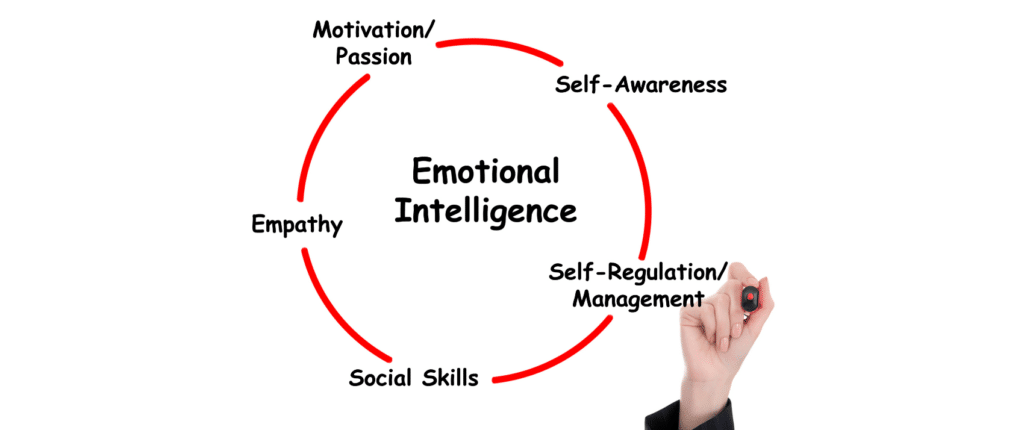85% of financial success is due to skills in ‘human engineering’, personality, and ability to communicate, negotiate, and lead. Shockingly, only 15% is due to technical knowledge.
This statistic, jolts us into recognising the paramount importance of emotional intelligence (EQ) in the corporate world. Imagine walking into a meeting, and instead of the usual tension, you’re met with a sense of understanding and collaboration. This is the power of Emotional Intelligence at work. It’s not just about being aware of your emotions but also understanding and influencing the emotions of others. In the corporate world, this translates to better team dynamics, more effective leadership, and ultimately, a healthier bottom line.

The Power of Emotional Intelligence
Leaders with high emotional intelligence create more connected and motivated teams. They are adept at conflict resolution, can navigate through office politics smoothly, and are often seen as authentic and trustworthy. In a study, CEOs with higher levels of EQ were found to have a direct impact on their organisation’s performance.
As we navigate through the exciting and ever-evolving world of 2024, where businesses face unprecedented challenges and opportunities, EQ emerges as a critical skill set. It’s not just about being empathetic or a good listener; it’s a complex amalgamation of self-awareness, self-regulation, motivation, empathy, and social skills. These components are often undervalued, yet they are the bedrock of successful leadership and effective team dynamics.
The Components of Emotional Intelligence

-
Self-Awareness: The Foundation of EQ
Self-awareness, the cornerstone of EQ, involves understanding your emotions, strengths, weaknesses, and drives. Leaders with high self-awareness are more adept at handling workplace dynamics and are better decision-makers. For instance, a study by Green Peak Partners found that high self-awareness correlates with a company’s profitability and efficiency.
-
Self-Regulation: Steering Through Storms
Business leaders often face situations requiring immediate response and long-term vision. Self-regulation, which involves controlling or redirecting disruptive emotions and adapting to changing circumstances, proves vital here. It ensures leaders can make balanced decisions without being clouded by temporary emotions or biases.
-
Motivation: The Inner Drive
Intrinsic motivation, a key component of EQ, is about being driven to achieve for the sake of achievement. This aspect of EQ is particularly significant in the business world. A motivated leader inspires others, driving their team to achieve more and fostering a high-performance culture.
-
Empathy: The Connective Tissue in Corporate Relationships
Empathy, the ability to understand and share the feelings of another, is crucial in today’s globalised business environment. It aids in building and nurturing relationships, understanding team dynamics, and resolving conflicts. Empathetic leaders are often more effective in negotiations, customer relations, and all facets of people management.
-
Social Skills: Navigating the Social Labyrinth of Business
The final component of EQ, social skills, refers to the skills needed to manage relationships and build networks. Leaders with strong social skills are excellent at managing teams and communicating effectively, making them invaluable in any corporate setting.

How to Develop Emotional Intelligence
While some people may be naturally more emotionally intelligent, the great news is EQ can be developed and honed. Here are some suggestions:
- Self-Reflection: Regularly take time to reflect on your own emotional reactions and understand why they occur.
- Active Listening: Truly listen to what others are saying without immediately responding or judging.
- Feedback Seeking: Openly ask for and be receptive to feedback from colleagues and mentors.
- Empathy Practice: Make a conscious effort to understand things from others’ perspectives.
- Stress Management: Develop techniques to manage stress and remain calm under pressure.
Developing EQ is not an overnight feat. It’s a continuous journey, one that involves consistent self-reflection, practice, and feedback. Training programmes, like those offered by Regenesys Corporate Education, play a crucial role in this development process. They provide the necessary tools and environments to nurture and enhance these skills, blending theoretical knowledge with practical application.
Emotional Intelligence: The Future of Business Leadership
As we move forward in this fast-paced, ever-evolving business world, the importance of EQ only magnifies. Companies that recognise and invest in developing emotional intelligence among their leaders and teams are poised for greater success, resilience, and sustainability.

One often overlooked aspect of emotional intelligence is its impact on employee retention. In an era where the cost of employee turnover is staggeringly high, retaining talented individuals becomes a key concern for businesses. Leaders with high emotional intelligence are more likely to create a work environment that values and nurtures its employees, leading to higher job satisfaction and loyalty.
A supportive work environment is one where employees feel their emotional needs are understood and respected. This includes recognising achievements, providing constructive feedback, and offering opportunities for professional growth. Such an environment not only boosts morale but also encourages long-term commitment to the company.
The Transformative Impact of Emotional Intelligence Training
Delving deeper into the realm of EQ development, it’s important to understand the transformative impact that structured training can have. Programmes like those offered by Regenesys Corporate Education are designed not only to impart knowledge but also to foster a profound change in attitude and perspective. This holistic approach ensures that the lessons learned transcend beyond the classroom, embedding themselves into the very fabric of an organisation’s culture.

The Synergy of EQ and Technical Skills
While EQ accounts for a significant portion of success in the corporate world, it doesn’t diminish the importance of technical skills. Instead, it complements them. For instance, a manager proficient in financial analysis is far more effective when they can present their findings empathetically and motivate their team to achieve common goals. This synergy of EQ and technical skills creates a well-rounded, impactful leader.
The Benefits of Emotional Intelligence in Organisations
In sales or client management roles, emotional intelligence is paramount. Being able to read a client’s non-verbal cues and understanding their emotional state can help tailor your approach, making your interactions more successful and meaningful.
The benefits of high EQ in leadership ripple throughout an organisation. Teams led by emotionally intelligent leaders often exhibit higher engagement, reduced turnover, and increased productivity. This positive environment fosters creativity and innovation, essential for businesses to thrive in today’s competitive market.

Challenges in Developing Emotional Intelligence
Developing EQ is not without its challenges. It requires a willingness to be vulnerable, to engage in introspective reflection, and to confront potentially uncomfortable truths about oneself. However, the growth that comes from this process is invaluable, both for personal development and professional advancement.
How to Build a Culture of Emotional Intelligence
Creating a culture of emotional intelligence starts at the top. When leaders model emotionally intelligent behaviour, it sets a precedent for the entire organisation. This involves transparent communication, showing genuine concern for employees’ well-being, and making decisions that consider the emotional impact on the workforce.

Emotional intelligence is also key in fostering diversity and inclusion in the workplace. Leaders who are emotionally intelligent are better equipped to understand and value diverse perspectives and backgrounds, creating an inclusive environment where all employees feel valued and understood.
The Future of EQ in Business Education
Innovation thrives in environments where people feel safe to express their ideas and take risks. A leader with high EQ creates such an environment by fostering trust and open communication. When team members feel their contributions are valued and their workplace is supportive, they are more likely to share creative solutions and innovative ideas.
Looking forward, the integration of EQ training in business education is becoming increasingly important. As the corporate world evolves, the demand for leaders who can navigate complex emotional landscapes is on the rise. Business schools like Regenesys Corporate Education, which focus on holistic development are at the forefront of this evolution, shaping the leaders of tomorrow.

Investing in Emotional Intelligence
Emotional intelligence is not just a ‘nice-to-have’ attribute for business leaders—it’s a critical component of effective leadership, team management, and overall business success. As we harness and develop these skills within our teams and leaders, we unlock new levels of potential, paving the way for innovation, growth, and lasting success in the corporate world.
Emotional intelligence is more than a business buzzword; it’s a fundamental skill set for anyone aspiring to lead and succeed in today’s corporate world. By investing in emotional intelligence, you’re not just investing in individual skills but in the future of your entire organisation.
The journey to developing EQ is ongoing, but the rewards – both personal and professional – are immense. As we embrace this journey, let us remember that the path to success is not just about what we know, but also about how we connect, lead, and inspire those around us.



